Imagine a world where every fabric tells a story of ancient traditions, skilled hands, and sustainable practices. Welcome to the vibrant world of Indian textiles, where history and innovation intertwine to create a rich tapestry of excellence.
This article will help you discover why India is a global leader in textile production, the fascinating stories behind its artisanal techniques, and the critical role consumers play in shaping the industry’s future.
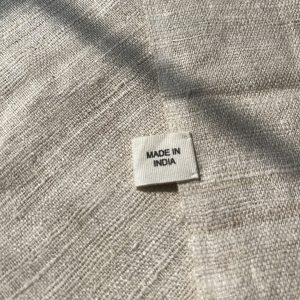
Hand spun hand woven ahimsa silk also call wild silk produced in bihar state (INDIA)
India has been known for producing a wide variety of textiles that merge traditional values with contemporary innovation and have made it a great textile country. The Indus Valley Civilization (around 2500 BCE) is known to have produced cotton textiles, as evidenced by archaeological findings.
India was one of the first places to grow and weave cotton, which has continued to be practiced in different forms through centuries. Centuries ago, merchants from China, Egypt, and Rome traveled far and wide to acquire diverse kinds of Indian textiles like expensive muslins from Bengal that were so fine they could pass through a ring, delicate silks from Gujarat, lively Rajasthani cotton prints, among many others.
Sustainable production leader
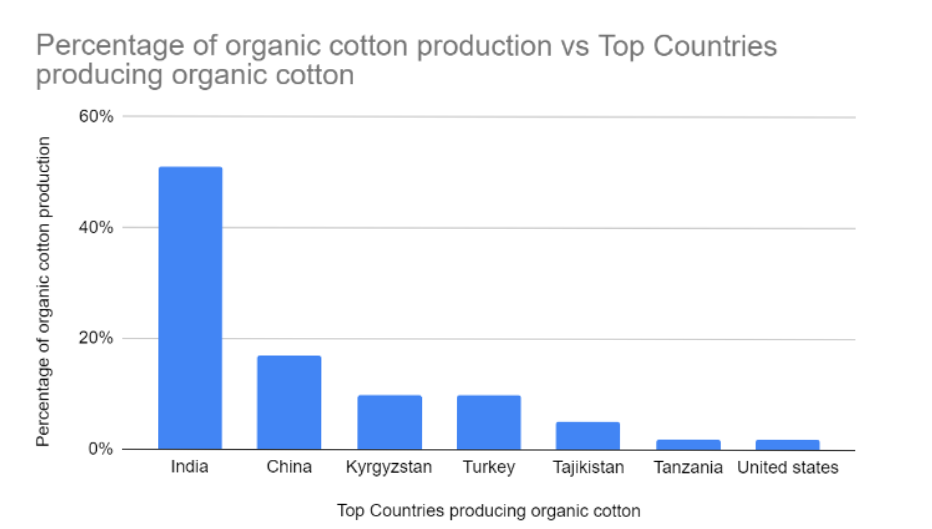
Today, India plays a major role in the sustainable textile industry. According to various reports, India ranked top in the list contributing about 51% in the global organic cotton production (2020 data).
India’s dominance is supported by robust infrastructure, including certified spinning and weaving facilities that ensure organic integrity throughout the supply chain.
GOTS, or the Global Organic Textile Standard, is an internationally recognized certification that ensures textiles are made from organic fibers and processed in a socially and environmentally responsible manner.
For a textile product to be GOTS certified, it must meet strict criteria at every stage of production, from raw material harvesting to manufacturing, labeling, and distribution. It also controls the use of chemicals and dyes, ensuring that they are non-toxic and biodegradable and mandates proper wastewater treatment to reduce environmental pollution.
India stands first in terms of factories which is GOTS certified . The top ten countries in terms of total numbers of GOTS certified facilities in 2020 are: India (3,015), Bangladesh (1,584), Turkey (1,107), China (961), Germany (684), Italy (588), Portugal (449), Pakistan (391), USA (167), and Sri Lanka (126).

Artisanal excellence
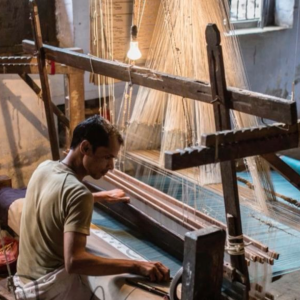
India is renowned for its beautiful artisanal fabrics, which are made by spinning, weaving and some techniques such as block printing, dyeing, and embroidery that have been passed on from generation to generation.
Handloom sector in the country employs over 3.52 million weavers, and exports handloom products to more than 20 countries worldwide.
Weaving is one of the oldest crafts in India, with each region boasting unique techniques and styles. Indian weavers create fabrics that are both artistic and functional.
Block printing for instance,is one of India’s oldest and most cherished textile arts, with a history that stretches back over two millennia. It is the process of carving intricate designs onto wooden blocks, which are then dipped into pigments and hand stamped into fabric. This technique produces intricate designs that are highly valued for their uniqueness and beauty using a slow and meticulous process, requiring great skill and precision.
Colors are also playing a vital role in the textile industry. Dating back to ancient times, Indian artists have mastered the ability of obtaining bright colors from natural sources such as plants, minerals, and insects. Indigo, a deep blue dye derived from the Indigofera tinctoria plant, was so valuable that it became a major export .
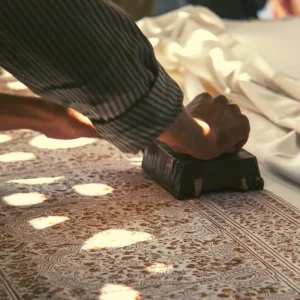
Changing perceptions about India
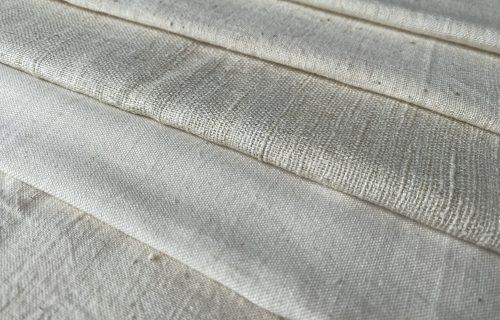
Western perceptions of India often focus on cheap labor and low-quality products. It is crucial to change this narrative by emphasizing the country’s strengths in artisanal workmanship, sustainable practices, and high-quality production.
Global demand for low-cost textiles has pushed Indian manufacturers to reduce costs, frequently resulting in lower-quality products. This compromises the reputation of Indian textiles, which are usually regarded for their exceptional craftsmanship.
For example: The shift towards synthetic fabrics to meet cost demands has overshadowed the rich tradition of natural fibers in India.
India has a lot to offer towards sustainable textiles. For instance, choosing handmade fabrics over machine-made is a powerful way to empower rural communities.
On a larger scale, since India has a lot of infrastructures dedicated towards sustainable production, there are many options to help brands create more sustainable collections made in India.
At Green Tailor, we are proud to be part of this tradition. We are specialized in producing sustainable and eco-friendly fabrics proudly made in India , including organic cotton fabric, linen fabric, silk fabric, and artisanal fabrics.
Our commitment to quality and sustainability ensures that every product you choose supports ethical practices and preserves the rich heritage of Indian textiles.
We also offer wide range of services which includes labeling, quality checks, packaging and exporting by providing comprehensive support to bring your vision to life.
References
https://www.fibre2fashion.com/industry-article/2363/indian-textile-industry-an-overview
https://www.ibef.org/exports/handloom-industry-india
https://www.jdinstitute.edu.in/history-of-block-printing-with-infographics/
